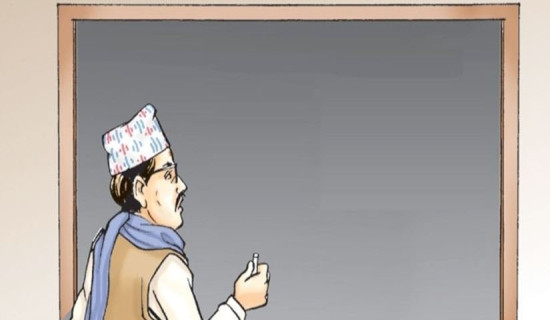- Sunday, 1 February 2026
Revenue collection, capital expenditure remain sluggish
Kathmandu, Jan. 23: The gap between the government's revenue collection and total expenditure is still significant contrary to the hopes that the half-yearly payment of taxes and other receipts would bridge this gap.
By Saturday, total receipts of the government were Rs. 501.3 billion - 34.37 per cent of the total annual target of Rs. 1,458.6 billion. But government expenditure the other day stood at Rs. 588.9 billion which is larger by Rs. 87.6 billion than the income.
However, there has been an improvement in terms of reducing gap between the income and expenditure in January 2023. Twenty days ago, on January 2, this gap stood at Rs. 113.5 billion which had raised the concerns of the government and the private sector since the government revenues were not enough to finance the everyday expenses of the government and loan servicing. The gap was of Rs. 45.8 billion in mid-October last year with Rs. 232.5 billion income and Rs. 278.3 billion expenditure.
Earlier, on January 21 last year, the government collected Rs. 600.3 billion in revenue and mobilised Rs. 523.1 billion expenditure. Improving the sluggish revenue collection and raising enough funds to finance government expenditures including for the development works and debt financing is the largest challenge for the government amidst the economic challenges and looming international economic slowdown.

Meanwhile, most of the development works have been halted due to government ban on illegal crusher industries across the country. Since most of them have not fulfilled the environmental and social criteria to legally use the natural resources, there is a risk of continued shortage of construction materials which will further hamper the progress at the development projects.
Deputy Prime Minister and Finance Minister, Bishnu Prasad Paudel, has been saying that his ministry is devising a strategy to boost the revenue collection and capital expenditure. Banks and private sector entrepreneurs have also been suggesting the government to increase the capital expenditure so that the funds could move to the financial system from the government coffers which will increase the liquidity in the market and push the interest rates down motivating the businesses expand their activities or start new ones.
Meanwhile, capital expenditure has continued to remain pathetic with just 14.67 per cent even after the end of the first half of the current fiscal year. In monetary terms, the government could spend only Rs. 55.8 billion from the total capital allocation of Rs. 380.3 billion. Only 21.2 per cent of the total budget of Rs. 1793.8 billion was allocated for development work which is just 7.8 per cent of the Gross Domestic Product of the country. According to the government estimates, the size of national economy would reach Rs. 4850 billion in 2022. According to various studies, Nepal needs to spend 8-12 per cent of its GDP in infrastructure development only.
However, this is not a unique phenomenon since the utilisation of the development budget was just 13.96 per cent in the last fiscal 2021/22 and 15.04 per cent in 2020/21. Underutilisation has been a recurrent problem in Nepal for the past many years which has severe repercussions in the development works. The government had formed various commissions and task forces to suggest effective ways to increase the development budget but there has been a little progress.
















-original-thumb.jpg)